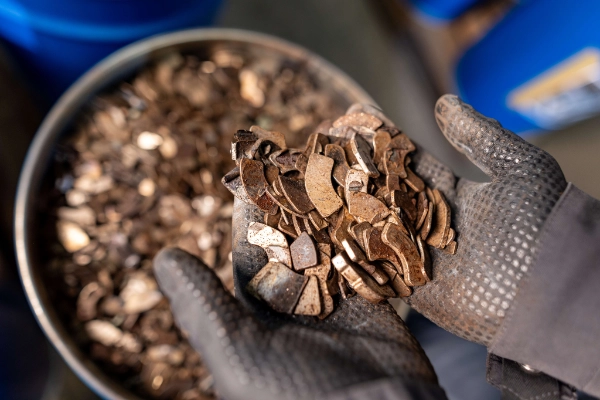- Member of the Bundestag for Dessau-Wittenberg meets representatives of Heraeus Comvance and Remloy
- Lemke visits production facilities
- Discussions on challenges facing the European glass fibre industry
- Exchange on the recycling of rare earth magnets and the importance for Europe
Bitterfeld-Wolfen, 21 June 2024 - Federal Environment Minister Steffi Lemke recently visited the Heraeus production site in Bitterfeld-Wolfen. In her role as a member of the German Bundestag for the Dessau-Wittenberg constituency, she wanted to get to know the business on site and find out how she can support the location.
Heraeus sees itself as an industrial and innovation leader in Europe and feels a responsibility to continuously invest in new and sustainable technologies. Lemke (Green Party) discussed both economic challenges and the impact of political decisions on European companies with Heraeus representatives.
The management of Heraeus Comvance, a leading manufacturer of high-purity quartz glass, took the opportunity to explain how the high-purity quartz glass required for glass fibres is produced synthetically during a tour of the production facility. Today, optical fibres form the basis of a critical infrastructure for data exchange and make a significant contribution to sustainability by significantly reducing CO2 emissions per unit of data transmitted compared to conventional technologies. Thanks to their high capacity, they make today's Internet possible in the first place, which would no longer be feasible on the basis of copper cables.

Largest recycling plant for rare earth magnets in Europe
Steffi Lemke then had the opportunity to visit Europe's largest recycling plant for rare earth magnets from Heraeus Remloy. Almost half of all rare earths are used for permanent magnets today. They have a wide range of applications and are used, for example, in high-performance electric drives, wind turbines and sensors. The recycling technology enables resource-saving processing of used magnets, reduces CO2 consumption by 80 per cent compared to primary production, but achieves the same quality of magnets.
Intensive discussions took place during the visit with the aim of finding joint solutions to strengthen the location in Bitterfeld-Wolfen and promote the European industrial landscape in general. "Steffi Lemke's visit emphasises the importance of our technologies and our commitment to sustainability. We hope to continue to receive support from the German government to strengthen European industry and drive sustainable innovation,’ said Jan Vydra, Managing Director of Heraeus Comvance. He expressed the expectation that Europe and Germany will prioritise the sustainable products of European industry when providing financial support for broadband expansion as a critical infrastructure. Subsidies, which are currently paid out of taxpayers' money to make fibre optic house connections possible, should also benefit regional jobs and technology developments. Specifically, the allocation of subsidies could be linked to tender criteria that favour low-carbon products and products from the European Union. Heraeus Comvance knows from its international production sites and customer landscape that this is a matter of course in the USA, for example.

David Bender, Head of Heraeus Remloy, emphasised the importance of political measures to promote the economic recycling of rare earths in Europe. He emphasised how important it is to prevent the uncontrolled migration of end-of-life magnetic materials from Europe and to react to politically influenced prices for imports of magnetic materials. ‘An independent supply of magnetic materials is a basic prerequisite for European competitiveness in the coming decades,’ explains David Bender. Industry and politics must work together on solutions to reduce dependencies and at the same time shape a sustainable future for Europe.



